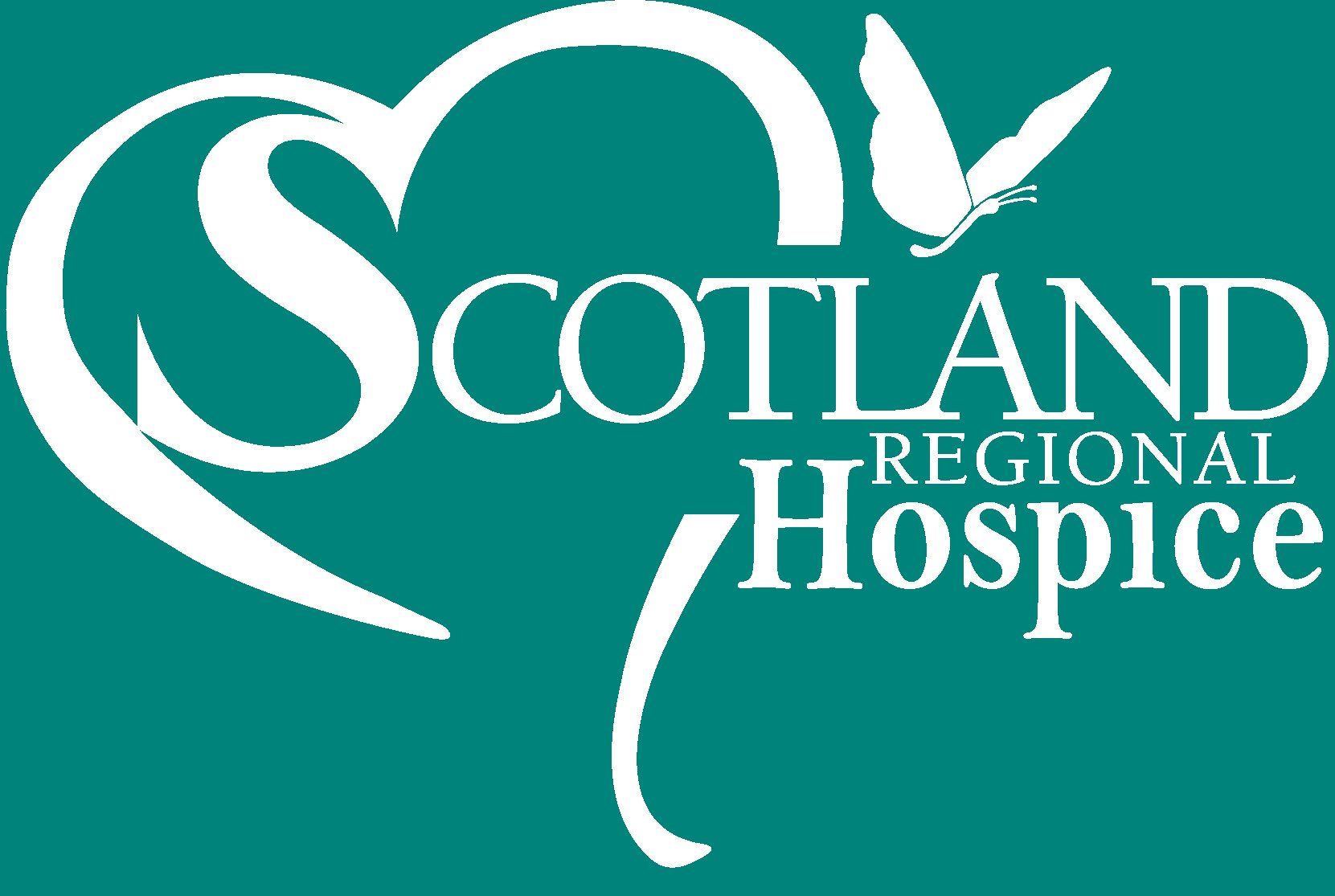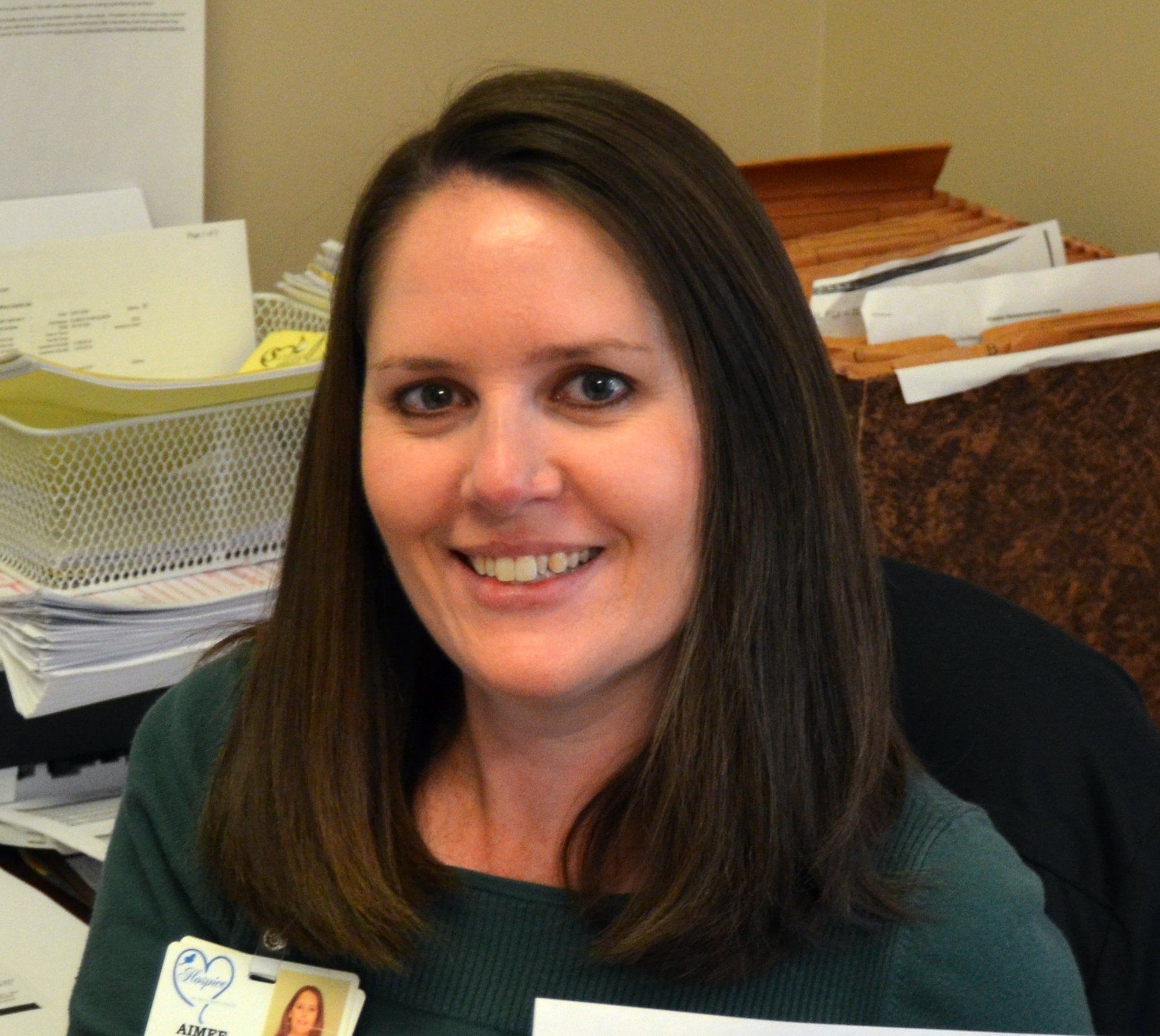
Scotland Regional Hospice has announced the appointment of its new director of finance, Aimee Johnson.
Johnson has served as the organization’s assistant director of finance for the last 11 years. During that time, she worked with her predecessor and friend Pauline Gruver who recently retired from the role after 22 years. Johnson will join the organization’s leadership team and be responsible for planning, implementing, managing and controlling all financial-related activities.
“Aimee will oversee all of our patient billing, accounts payable and receivable, and payroll functions,” said Kim Hammonds, Scotland Regional Hospice executive director. “She is passionate about our cause as well as the success and sustainability of our organization. She has been a huge asset to Scotland Regional Hospice over the years and we are excited that she has accepted this new role. I know she will do a wonderful job.”
In addition to leading all financial operations, Johnson will assist with Scotland Regional Hospice’s fundraising efforts. She will assume advisory roles on the organization’s Lean, Appropriate Care, and Professional Advisory committees each of which plays a part in improving the quality of patient care while also strengthening the organization’s financial stability.
Johnson also serves as the accounting lead for The American Cancer Society’s Relay For Life fundraiser in Scotland County creating a bridge between the two non-profit organizations. Because of that relationship, the Scotland Regional Hospice Relay For Life team, the Hospice Hearts, has been the top fundraiser among health care providers in Scotland County since 2015.
“I am grateful for this opportunity,” shared Johnson. “It is an honor to be part of such a wonderful organization that is committed to providing compassionate end-of-life care to the patients and families in our community.”
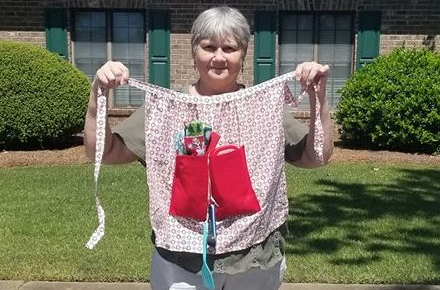
With many of the hospice volunteer opportunities on-hold due to COVID-19, the volunteer department at Scotland Regional Hospice has found other ways to contribute their time and talents to improving patient care as well as boosting staff morale. Over the last few months, the volunteers have had a hand in everything from campus beautification to providing handmade masks to the staff and of course feeding the staff, patients, and visiting families from time to time. Now, some volunteers have started a project that is new to Scotland Regional Hospice – making fidget aprons.
Often seen in a blanket form, fidget aprons are one of the many tools used to provide tactile stimulation for someone with Alzheimer’s or other dementia. Many safe to touch items like large buttons, ribbons, and small plush toys are sewn onto the aprons giving the restless hands of dementia patients something to do. The aprons are a useful coping mechanism for those who have trouble staying still or remaining calm.
“We got the idea to start making fidget blankets online, but then one of our volunteers brought in an apron and we loved it,” shared Bunny Hasty, Scotland Regional Hospice volunteer coordinator. “(Hospice volunteer) Charlotte Pilson brought in an apron filled with kitchen gadgets and it was immediately used and enjoyed by one of our guests at Morrison Manor. It was so well received that we are going to make more.”
Hasty said that an apron with safe to handle hand tools is in the works, but was quick to point out that the aprons do not need to be themed in any way. “Items attached to the aprons just need to be safe to touch, but can have just about anything attached to them,” she explained. “What the aprons look like is not important. They just need a variety of textures and things to keep hands and fingers busy.”
Using aprons instead blankets allows caregivers or the patient care team to tie the straps around those with dementia keeping fidget items in place. Apron pockets provide storage space for attached items to be tucked away when not in use.
If you would like to assist the Scotland Regional Hospice volunteer department in its efforts to produce the aprons, consider donating the following items that you may have around your home:
- Zippers
- Small pom poms
- Tassels
- Large colorful Buttons
- Large Beads
- Small plush animals, balls, or other items
- Ribbon
- Pieces of string or yarn
- Scrunchies
- Fleece material that you might have left from other projects
- Baby toys (rattles, big keys, etc.)
Also, if you enjoy sewing or crafting, please consider making and donating a fidget apron or blanket to Scotland Regional Hospice.
For more information about volunteer services at Scotland Regional Hospice, please call Bunny Hasty at (910)276-7176 or visit scotlandhospice.org.
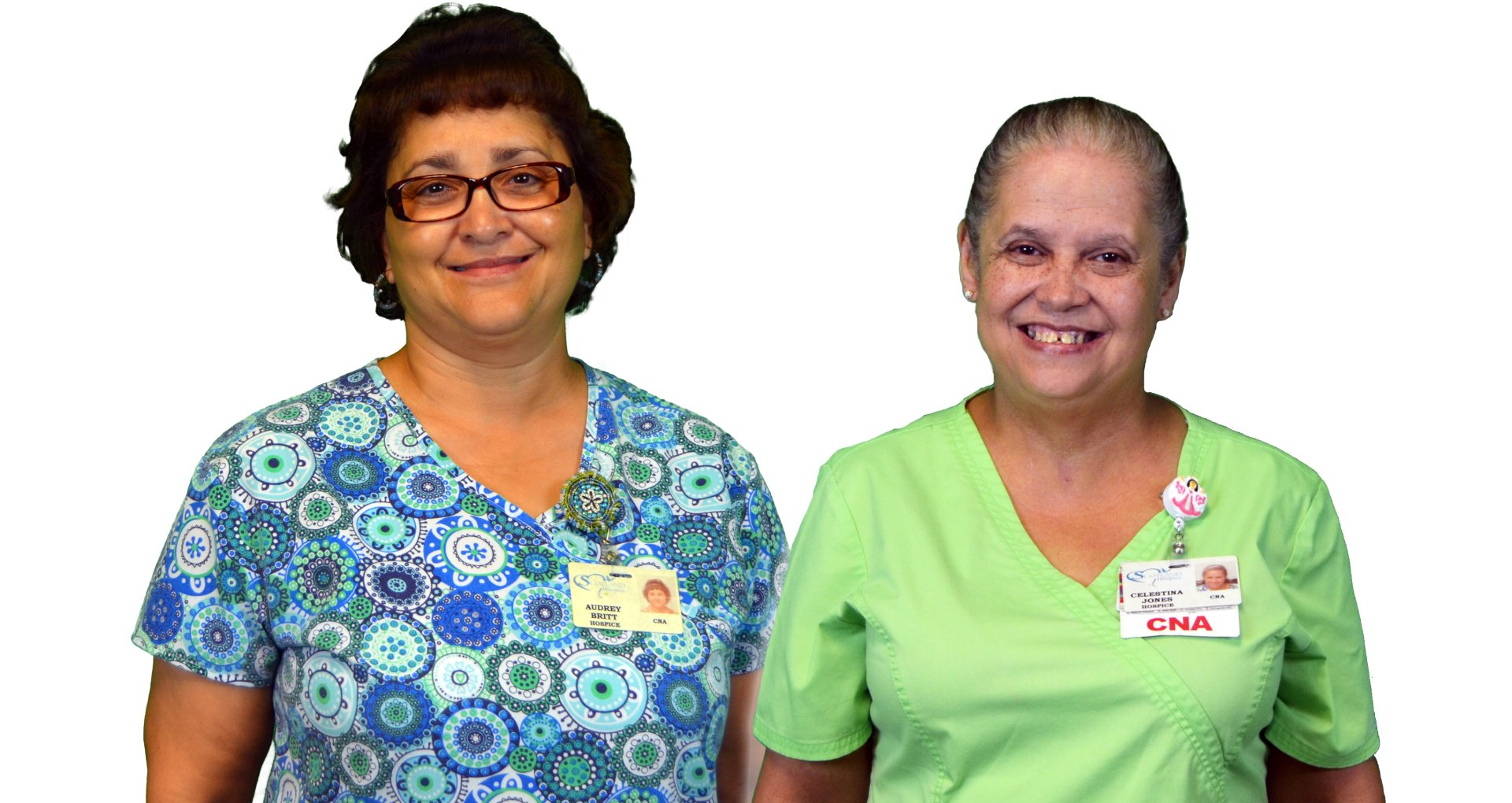
Scotland Regional Hospice has professionals from many disciplines working together in order make sure that each patient receives the best, personalized care possible. As with all forms of healthcare, it is easy to focus solely on the clinical side of hospice care. However, in an effort to improve the quality of life for the terminally ill, hospice also offers services such as companionship, assistance with personal care, and emotional and spiritual support to patients and their families. While Scotland Regional Hospice has physicians, nurses, social workers, and even a chaplain on staff, nobody on the hospice team exemplifies all facets of hospice care quite like the certified nursing assistant (CNA).
Hospice CNAs have more face-to-face interactions with the patients than any other member of the patient care team. Since most hospice patients receive care in their homes, hospice CNAs have the added risks of additional travel and regularly working in uncontrolled environments. These risks are compounded by the COVID-19 pandemic.
With guidance from Scotland Health Care System, the hospice staff has been equipped with the training and protective gear needed to provide uninterrupted care to its patients in a way that will minimize exposure to themselves, patients and families.
“We are taking all precautions to keep our patients safe,” explained Celestina Jones, hospice CNA. We want to provide the best possible quality of care without raising concerns about the spread of infection. The comfort and safety of our patients is our top priority.”
CNAs provide companionship and personal care to patients such as changing bedding, changing clothing, bathing, and feeding. This intimate interaction with the patients allows them to form bonds that create trusting, caring relationships. Simply being present can have a big impact on the emotional well-being of their patients, but a CNA’s presence can enhance the medical care that their patients receive.
Since patients are visited by a CNA more than any other member of the hospice team, CNAs act as observers. Any change, even a small one, can have an impact on a patient’s plan of care. Because of the regular interactions between a patient and his/her CNA, the CNA is often quick to notice those important changes and will report that information to the nurse. Quarantine efforts due to COVID-19 limited many of the interactions that some hospice patients shared with friends, family, and other caregivers making the consistent observations of CNAs even more important.
“The most important thing to me is just being there for our patients,” shared Audrey Britt, hospice CNA. Whether they need a lot of personal care services, just a little, or none at all; they always need our presence. I will always do my best to give them that companionship.”
Hospice patients can’t wait for COVID-19 to play out. It is essential that their quality and frequency of care is not disturbed by this pandemic. CNAs are an integral part of the hospice team and their unwavering commitment to their patients make it possible for Scotland Regional Hospice to fulfill its mission of providing safe, high-quality, compassionate care to the patients and families that it serves.

The outbreak of COVID-19 has disrupted many events in the area, including fundraisers that are essential to the sustainability to area non-profits. One such event is the Scotland Regional Hospice Golf Tournament that has been held annually for 33 uninterrupted years.
Since its inception, the hospice organization’s premier fundraiser has been sponsored each year by Eaton Golf Pride with Scotch Meadows Country Club playing host. This year’s tournament was slated for May 5-6, but North Carolina’s ban of gatherings of 10 or more people in an effort to reduce the spread of COVID-19 put the event’s three decade tradition in jeopardy.
After several discussions about whether to postpone the event or to cancel it altogether, tournament organizers have decided to try again in the fall.
“We would like to have it in late September or early October,” said Bill Hill, long-time hospice supporter and one of the event’s founders. “It will be cooler by then and will give us time to put everything back together.”
Event organizers weighed the pros and cons of cancellation, but in the end, decided to reschedule.
“We examined things like how the economy and charitable giving would be impacted by COVID-19 and how the community’s fall event calendar is likely to be very congested with other area postponements,” explained Deon Cranford, director of public relations at Scotland Regional Hospice. “The decision to move forward was unanimous among the staff, volunteers, and numerous local sponsors.
“The event is run almost entirely by volunteers,” Cranford continued. “Many of them have been involved for years and a few have even participated in the event since it started in 1987. This is more than just a fundraiser to so many of the hospice supporters in the community. I can understand why they would want to do everything possible to avoid cancellation.”
At this time, no date has been set. Event organizers are planning to meet in late June to reevaluate the impact that COVID-19 has had on the community, choose a date, and determine if any changes need to be made to the tournament’s traditional format as a result of the postponement.
Scotland Regional Hospice has already received sponsorships, in-kind contributions, silent auction items, and golfer registrations from dozens of area businesses and individuals. Even when cancellation was a possibility, some supporters made their donations after recommendations were made to suspend all area events. Those actions along with the continued support of Golf Pride influenced the decision to postpone rather than cancel.
“What is unique about this event is its longevity,” Cranford concluded. “For a large, international corporation and a small town non-profit hospice to maintain this type of a relationship for over 30 years is incredible. We can’t thank Golf Pride and Scotch Meadows enough for their support and willingness to move the event. Also, thanks to all of the volunteers and sponsors in the community who make this event possible year after year."

While non-essential services in North Carolina have ceased after Gov. Roy Cooper’s stay-at-home order went into effect on Monday, the executive director of Scotland Regional Hospice ensures that their services remain in operation.
“We share the community’s concerns regarding COVID-19, but we feel confident in our ability to provide uninterrupted care in a way that will minimize exposure to others,“ said Kim Hammonds, Scotland Regional Hospice executive director. “We are fully operational in all services and continue to accept new referrals.”
Hospice services remain available 24/7 including nights and weekends, to residents of Scotland, Robeson, Hoke, and Richmond counties in North Carolina and Marlboro, Dillon, and Chesterfield counties in South Carolina. Patient care continues to be provided at the organization’s inpatient facility, Morrison Manor, or wherever the patients call home (hospitals, skilled nursing facilities, assisted living facilities and private homes).
The staff is continually monitoring communication from the Centers for Disease Control and Prevention (CDC), the North Carolina Department of Health and Human Services (NCDHHS), and the South Carolina Department of Health and Human Services (SCDHHS) and will make adjustments as new information and details emerge.
“Scotland Regional Hospice has stood the test of time for more than 34 years,” Hammonds continued. “Even in these uncertain times, we will continue to stay true to our mission of providing safe, high-quality, compassionate care to the patients and families that we serve.”
For questions about hospice services or to make a referral, please call (910)276-7176.
Scotland Regional Hospice has made some changes to the staffing structure at its inpatient facility, Morrison Manor. These changes will allow the facility to increase its occupancy from 6 to 10 patients with a nurse to patient ratio of 1:5 or fewer at all times. Morrison Manor can now offer exceptional end-of-life care to even more patients, but encouraging those with life-limiting illnesses to utilize these services requires erasing the stigma that is often associated with hospice houses.
As part of its National Hospice and Palliative Care Month activities in November, Scotland Regional Hospice used a series of puzzles to quiz hundreds of people in the community on their hospice knowledge. Over 80% of respondents felt that patients were only admitted to Morrison Manor in the final moments of life so that they can pass away peacefully and free from pain. The belief that hospice inpatient facilities only offer a quiet place to die is one of the biggest misconceptions associated with hospice care.
Morrison Manor offers three levels of care – general inpatient (GIP), routine, and respite care. All levels of care are intended to be short term.
“Being home, in familiar surroundings with loved ones is where hospice patients should be,” said Dr. Valeriana Esteves-Jute, Scotland Regional Hospice medical director. “Home is where people want to be at the end-of-life. It’s our mission to do everything we can to make that happen.”
For patients whose pain and symptoms are difficult to control near the end of life, his/her family may opt to have their loved one pass away in comfort at Morrison Manor. Late hospice referrals and instances of patients suffering sudden illness or injury are other reasons that a Morrison Manor admission may be chosen over home care. If possible, the first choice is always to allow the patient to enjoy the time that they have left in the place that they call home.
GIP, Morrison Manor’s most common level of care, is designed for those patients whose symptoms become so severe that providing adequate care in their home setting becomes challenging. Patients can be transferred temporarily to Morrison Manor to receive round-the-clock care from the facility’s skilled staff.
“Many of our patients come by for what I call tune-ups,” explained Esteves-Jute. “They may be fighting an infection, or have short-term symptoms that we cannot easily treat at home. We bring them to Morrison Manor, give them a tune-up, make them feel better, and send them back home.”
Respite care is a Medicare benefit that offers hospice patients a five day stay per month to provide a brief respite for the patient’s primary caregiver. The hospice staff develops an individualized plan of care with each patient and family that it serves. Since respite patients typically do not need additional care outside of that plan, they receive the benefits of 24-hour inpatient care without meeting the criteria to qualify for inpatient care. In an effort to improve the quality of life, the Morrison Manor staff takes the opportunity to pamper their temporary visitors with exceptional comfort care and companionship. As a result, Esteves-Jute playfully refers to respite care as spa days.
“Many patients do not want to come to Morrison Manor because they are afraid that they will never leave,” explained Esteves-Jute. “Respite days are our opportunity to gain their trust and to show them that they do not have to be afraid of (Morrison Manor). We use those spa days to provide them with physical comfort and give them some peace of mind. Some of them are already planning their next visit before they leave to go back home.”
Since it provides some relief to patients and caregivers, those that experience respite care tend to utilize the benefit as often as possible. Current hospice patient Jack Mathews has received respite care on multiple occasions. His vibrant personality and gift for storytelling has made him a bit of a celebrity around the halls of Morrison Manor.
“I’ve been sick for about a year and-a-half now and (was admitted) to hospice a few weeks ago,” shared Mathews. “My wife is retired, but does quite a bit of volunteer work and she was needing a break. I came (to Morrison Manor) so that my wife could spend some time upstate with her daughter. They’ve been having a ball.”
“This place absolutely blows my mind,” Mathews continued. “They do wonders for a lot of people in this community. It really makes a difference. I’ve been right here in this county, but I’ve never been aware of what a serious job (the hospice staff) does. They are so good to me. I’m grateful.”
Scotland Regional Hospice also offers a routine level of care at Morrison Manor. This level is provided to those hospice patients who do not meet the criteria for a general inpatient visit, but circumstances have left them needing a place to stay longer than the 5-day respite benefit allows. This is a self-pay service often utilized by those waiting to be placed in a long-term care facility, whose caregivers become unavailable, or whose home environment has become unsafe.
Even with routine care, a discharge plan has to be in place at the time of admission. In every level of care, the goal is always to have patients spend their final moments in the place that they call home with those that they love.
Early admission is the best way to receive all of the benefits of hospice care. Many people are eligible for hospice care long before they are referred. Anyone can make a hospice referral. For more information on hospice care, please call Scotland Regional Hospice at 910-276-7176 or visit www.scotlandhospice.org.
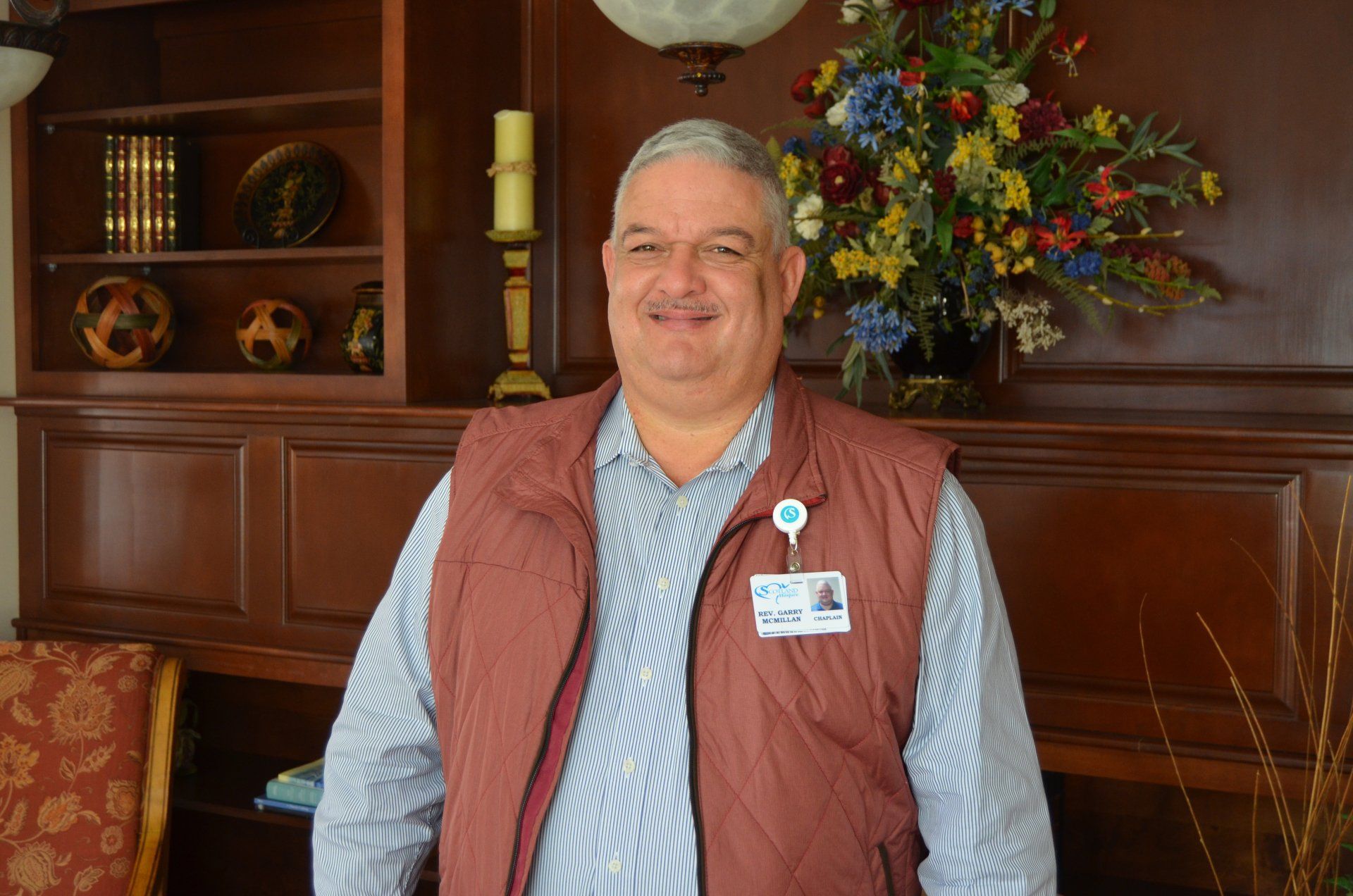
Pastor Garry McMillan has joined Scotland Regional Hospice as a chaplain to provide spiritual care to the patients and families who are served by the organization.
McMillan has been the pastor at Bethel Church located on Produce Market Road in Laurinburg since 2017, and is excited about having the opportunity to work with hospice families.
“I’ve always felt called to provide this type of care,” McMillan shared. “It’s God’s work.”
Spiritual care is a service that Medicare requires all hospice providers to offer. This means that in addition to acting as a symbol of faith, strength, and love during difficult end-of-life situations, a hospice chaplain must also be able plan, organize, and document each patient encounter.
McMillan worked for Peterson Toyota for 20 years. His time as a sales manager with the Lumberton-based car dealership has instilled in him the importance of successful business practices. The challenging work-faith balance required of a hospice chaplain is something that he hopes his two decades of business and sales experience will help him with.
“There would be many days when I would have to work long hours and then drive all the way to the hospital in Moore County where someone from our church was admitted,” McMillan explained. “If they needed me, I was going to be there. Being successful at work made it possible for me to also do God’s work. It’s such a blessing to be in a position where my job and being able to care for others are both the same.”
At Scotland Regional Hospice, the chaplain works as part of the family services team. McMillan will join the social workers, bereavement team, and volunteer department in offering empathy, emotional support, and companionship to the many families who are coping with terminal illness.
Family services are also responsible for many of the organization’s activities outside of clinical and personal care. These include support groups, advance directive education, the annual candlelight memorial service, Camp Spinoza – a grief camp for kids, and remaining in contact with families for up to thirteen months after their loved one has passed away. As a part of this team, McMillan will be involved in each of these activities as well.
“I look forward to learning all that I can about hospice,” McMillan concluded. “I can’t wait to get started.”
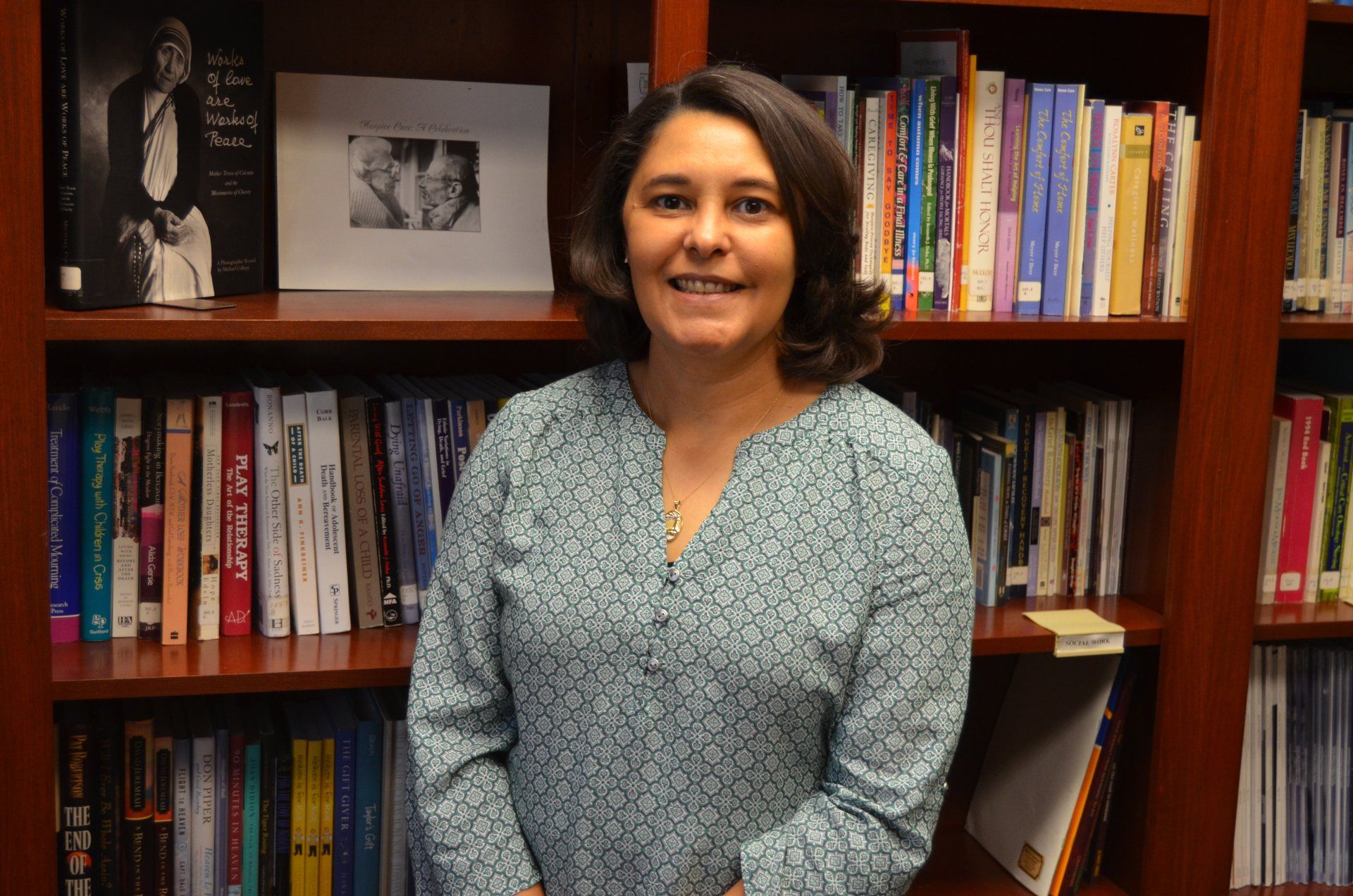
Scotland Regional Hospice is pleased to announce the appointment of Kim Hammonds, RN, as its executive director. Hammonds has served as the organization’s interim director since September and has quickly proven to be a great fit for the role.
Hammonds has been a nurse within Scotland Health Care System for more than 22 years, half of that time as a hospice case manager. Her various positions and experiences during that time have instilled in her an unwavering dedication to providing safe, quality, and compassionate care to those in our community.
“Kim is a well-respected dedicated nurse with a heart for hospice,” says Dr. Cheryl Davis, Scotland Health Care System’s chief medical officer and senior vice president of medical affairs. “She has past experience in Hospice, General Surgery and Quality before returning back to Hospice to lead the organization. She brings a quiet consistency and strong resolve for quality care that is a perfect example of our mission, Closer Care. Better by Far.”
After graduating from Sandhills Community College with an associate’s degree in nursing in 1997, Hammonds joined the health care system as a staff nurse at Scotland Memorial Hospital. Shortly after receiving her bachelor’s degree in nursing in 2003 from The University of North Carolina at Pembroke, she accepted the position of hospice case manager with Scotland Regional Hospice.
As a case manager, Hammonds communicated with the hospice interdisciplinary team which includes physicians, nurses, social workers, chaplains, and CNAs to ensure that all patient care plans were implemented appropriately.
She worked her way up to director of Patient Care Services and joined the leadership and interdisciplinary teams in developing the individualized care plans for each patient and family served by the organization. She managed all staff who worked in the homecare setting and her responsibilities grew to include staff evaluations, billing, and other administrative duties.
In 2015, Hammonds left hospice to work as a staff nurse at Scotland Surgical and GI with Dr. Stephen Lanuti. Lanuti, the former medical director for Scotland Regional Hospice, has worked with Hammonds throughout most of her nursing career.
“I have known Kim for over 22 years,” Lanuti shared. “I worked with her when she started out on (Surgical/Pediatrics) and then again when she went to hospice for eleven years. She worked with me again in surgical for two years. She has a passion for hospice and will no doubt be successful in her role.”
After her two-year stint at Scotland Surgical and GI, she transferred to the health care system’s quality department as a data analyst before returning to Scotland Regional Hospice in September of this year.
“Kim has served our system and our community for many years,” said Greg Wood, president and CEO of Scotland Health Care System. “We are delighted that she is sharing her tremendous talents and strong values with such a critical community service.”
As the executive director, Hammonds will be responsible for the overall administration and management of Scotland Regional Hospice. She will work closely with Scotland Regional Hospice’s advisory board, leadership team, interdisciplinary team, and its Medical Director, Dr. Valeriana Esteves-Jute, to ensure that that the organization is meeting its mission of providing exceptional end-of-life care to those in our community.
“Kim is an asset to hospice,” Esteves-Jute emphasized. “She has a heart devoted to those in need. Her previous hospice experience enhances her compassion and devotion to our mission. I believe our organization will flourish under her guidance. We are truly blessed to have her.”
Hammonds’ commitment to the organization’s success and sustainability stems from her connection to the community.
“Growing up in Robeson County and working for (Scotland Health Care System) for the past 22 years, I have a close connection to many of the people within the communities that we serve,” explained Hammonds. “I am honored and grateful to have the opportunity to continue that service to our communities as the Executive Director of Scotland Regional Hospice. I am committed to providing safe, high quality care for our patients and their families.”
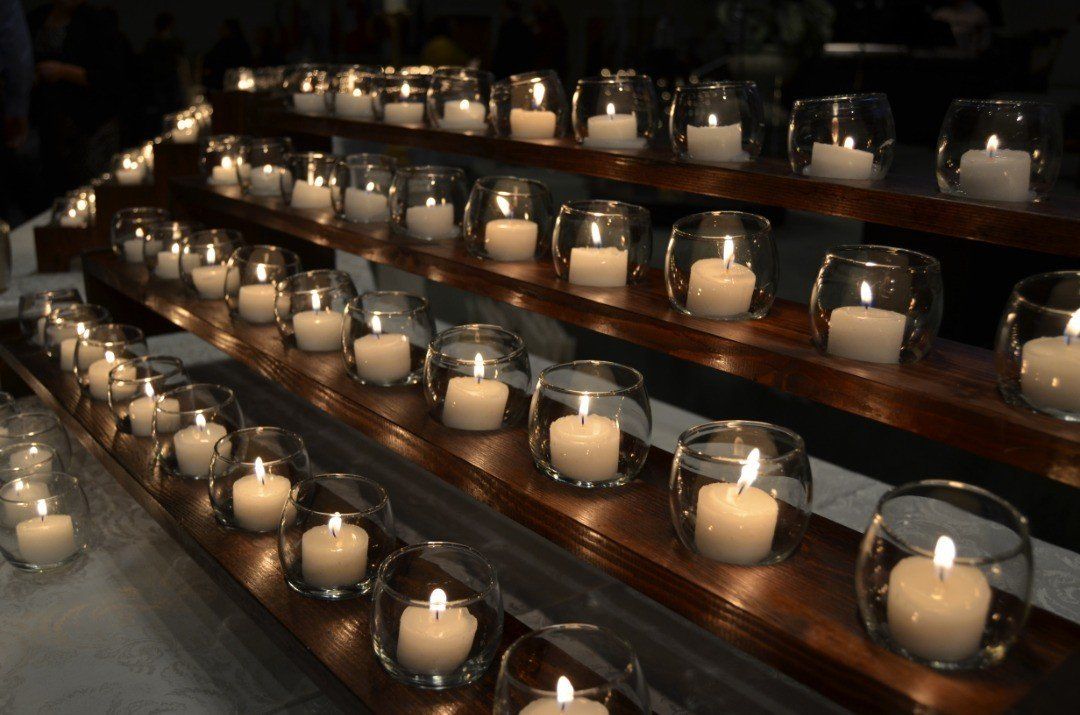
On Thursday, Nov. 21, Northview Harvest Ministries will once again play host to Scotland Regional Hospice’s annual Candlelight Memorial Service. Each year, hundreds of guests file into the church for the opportunity to celebrate and remember the lives of loved ones, friends, and acquaintances that have passed away during the last year.
“We welcome everyone to join us,” said Tanya Williams, director of family services for Scotland Regional Hospice. “This is not a service just for families and friends of hospice patients. We want anyone in the community who has suffered a loss over the last year to join us in remembrance of their loved one.”
This year’s ceremony will feature music from harpist Allison McLean and singing from Brett Davis, pastor of East Laurinburg Church of God. Thomas Marshall, interim pastor at the First Baptist Church of McColl, South Carolina, will moderate the evening service and this year’s guest speaker is Terry Hunt of First United Methodist Church of Laurinburg.
Lighting of the candles will take place following Hunt’s message. The names of Scotland Regional Hospice’s patients will be read and their families will have the opportunity to light a candle in their memory. After each name is read, there will be an opportunity for anyone from the community to light a candle in memory of a loved one.
Once the room is illuminated by the beautiful glowing light of more than 400 candles, Paul Baldwin of Galilee United Methodist Church will conclude the service with a blessing to the families.
Hospice volunteers will close out the evening by welcoming everyone into the fellowship hall where hospice staff and guests will be treated to cakes, coffee, punch, and other goodies. This provides families the opportunity to be reunited with CNAs, nurses, social workers, and other hospice staff and volunteers who provided care to their loved ones.
Northview Harvest Ministries is located at 17760 Log Cabin Road in Laurinburg (just off of Hwy. 401 between Laurinburg and Wagram). The service will begin at 7 p.m. with special music beginning at 6:30pm. With nearly 350 people attending annually, the sanctuary fills up fast. Families (especially large groups) are strongly encouraged to arrive early for seats if they plan to sit together.
For those unable to attend, the service will stream live on Scotland Regional Hospice’s Facebook page and will be available to watch later on the organization’s website (scotlandhospice.org). For more information on the Candlelight Memorial Service, please call 910-276-7176.
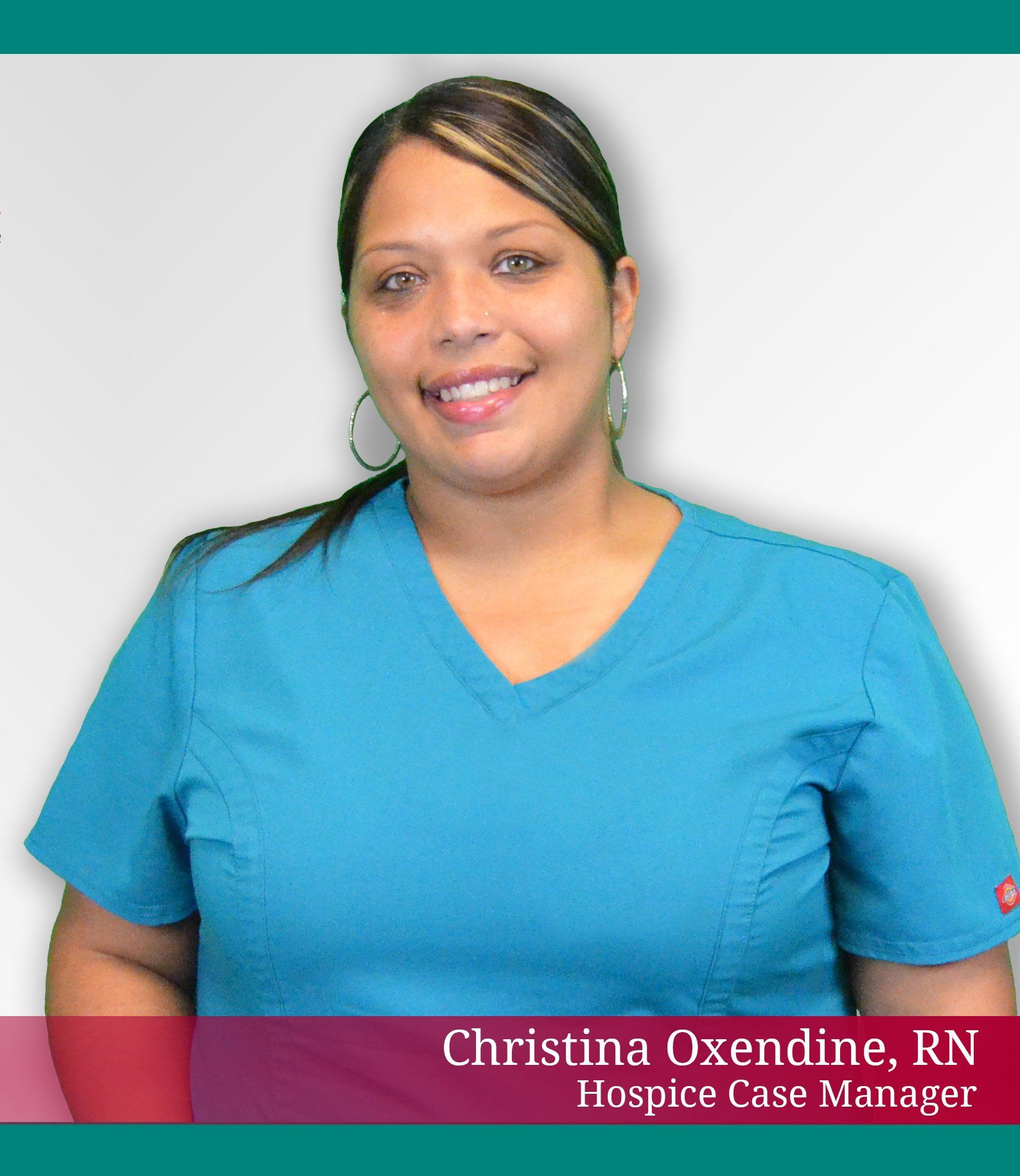

Scotland Regional Hospice has announced the appointment of its new director of finance, Aimee Johnson.
Johnson has served as the organization’s assistant director of finance for the last 11 years. During that time, she worked with her predecessor and friend Pauline Gruver who recently retired from the role after 22 years. Johnson will join the organization’s leadership team and be responsible for planning, implementing, managing and controlling all financial-related activities.
“Aimee will oversee all of our patient billing, accounts payable and receivable, and payroll functions,” said Kim Hammonds, Scotland Regional Hospice executive director. “She is passionate about our cause as well as the success and sustainability of our organization. She has been a huge asset to Scotland Regional Hospice over the years and we are excited that she has accepted this new role. I know she will do a wonderful job.”
In addition to leading all financial operations, Johnson will assist with Scotland Regional Hospice’s fundraising efforts. She will assume advisory roles on the organization’s Lean, Appropriate Care, and Professional Advisory committees each of which plays a part in improving the quality of patient care while also strengthening the organization’s financial stability.
Johnson also serves as the accounting lead for The American Cancer Society’s Relay For Life fundraiser in Scotland County creating a bridge between the two non-profit organizations. Because of that relationship, the Scotland Regional Hospice Relay For Life team, the Hospice Hearts, has been the top fundraiser among health care providers in Scotland County since 2015.
“I am grateful for this opportunity,” shared Johnson. “It is an honor to be part of such a wonderful organization that is committed to providing compassionate end-of-life care to the patients and families in our community.”

With many of the hospice volunteer opportunities on-hold due to COVID-19, the volunteer department at Scotland Regional Hospice has found other ways to contribute their time and talents to improving patient care as well as boosting staff morale. Over the last few months, the volunteers have had a hand in everything from campus beautification to providing handmade masks to the staff and of course feeding the staff, patients, and visiting families from time to time. Now, some volunteers have started a project that is new to Scotland Regional Hospice – making fidget aprons.
Often seen in a blanket form, fidget aprons are one of the many tools used to provide tactile stimulation for someone with Alzheimer’s or other dementia. Many safe to touch items like large buttons, ribbons, and small plush toys are sewn onto the aprons giving the restless hands of dementia patients something to do. The aprons are a useful coping mechanism for those who have trouble staying still or remaining calm.
“We got the idea to start making fidget blankets online, but then one of our volunteers brought in an apron and we loved it,” shared Bunny Hasty, Scotland Regional Hospice volunteer coordinator. “(Hospice volunteer) Charlotte Pilson brought in an apron filled with kitchen gadgets and it was immediately used and enjoyed by one of our guests at Morrison Manor. It was so well received that we are going to make more.”
Hasty said that an apron with safe to handle hand tools is in the works, but was quick to point out that the aprons do not need to be themed in any way. “Items attached to the aprons just need to be safe to touch, but can have just about anything attached to them,” she explained. “What the aprons look like is not important. They just need a variety of textures and things to keep hands and fingers busy.”
Using aprons instead blankets allows caregivers or the patient care team to tie the straps around those with dementia keeping fidget items in place. Apron pockets provide storage space for attached items to be tucked away when not in use.
If you would like to assist the Scotland Regional Hospice volunteer department in its efforts to produce the aprons, consider donating the following items that you may have around your home:
- Zippers
- Small pom poms
- Tassels
- Large colorful Buttons
- Large Beads
- Small plush animals, balls, or other items
- Ribbon
- Pieces of string or yarn
- Scrunchies
- Fleece material that you might have left from other projects
- Baby toys (rattles, big keys, etc.)
Also, if you enjoy sewing or crafting, please consider making and donating a fidget apron or blanket to Scotland Regional Hospice.
For more information about volunteer services at Scotland Regional Hospice, please call Bunny Hasty at (910)276-7176 or visit scotlandhospice.org.

Scotland Regional Hospice has professionals from many disciplines working together in order make sure that each patient receives the best, personalized care possible. As with all forms of healthcare, it is easy to focus solely on the clinical side of hospice care. However, in an effort to improve the quality of life for the terminally ill, hospice also offers services such as companionship, assistance with personal care, and emotional and spiritual support to patients and their families. While Scotland Regional Hospice has physicians, nurses, social workers, and even a chaplain on staff, nobody on the hospice team exemplifies all facets of hospice care quite like the certified nursing assistant (CNA).
Hospice CNAs have more face-to-face interactions with the patients than any other member of the patient care team. Since most hospice patients receive care in their homes, hospice CNAs have the added risks of additional travel and regularly working in uncontrolled environments. These risks are compounded by the COVID-19 pandemic.
With guidance from Scotland Health Care System, the hospice staff has been equipped with the training and protective gear needed to provide uninterrupted care to its patients in a way that will minimize exposure to themselves, patients and families.
“We are taking all precautions to keep our patients safe,” explained Celestina Jones, hospice CNA. We want to provide the best possible quality of care without raising concerns about the spread of infection. The comfort and safety of our patients is our top priority.”
CNAs provide companionship and personal care to patients such as changing bedding, changing clothing, bathing, and feeding. This intimate interaction with the patients allows them to form bonds that create trusting, caring relationships. Simply being present can have a big impact on the emotional well-being of their patients, but a CNA’s presence can enhance the medical care that their patients receive.
Since patients are visited by a CNA more than any other member of the hospice team, CNAs act as observers. Any change, even a small one, can have an impact on a patient’s plan of care. Because of the regular interactions between a patient and his/her CNA, the CNA is often quick to notice those important changes and will report that information to the nurse. Quarantine efforts due to COVID-19 limited many of the interactions that some hospice patients shared with friends, family, and other caregivers making the consistent observations of CNAs even more important.
“The most important thing to me is just being there for our patients,” shared Audrey Britt, hospice CNA. Whether they need a lot of personal care services, just a little, or none at all; they always need our presence. I will always do my best to give them that companionship.”
Hospice patients can’t wait for COVID-19 to play out. It is essential that their quality and frequency of care is not disturbed by this pandemic. CNAs are an integral part of the hospice team and their unwavering commitment to their patients make it possible for Scotland Regional Hospice to fulfill its mission of providing safe, high-quality, compassionate care to the patients and families that it serves.
